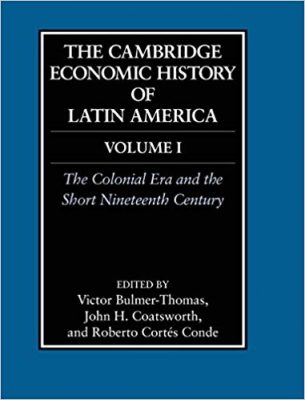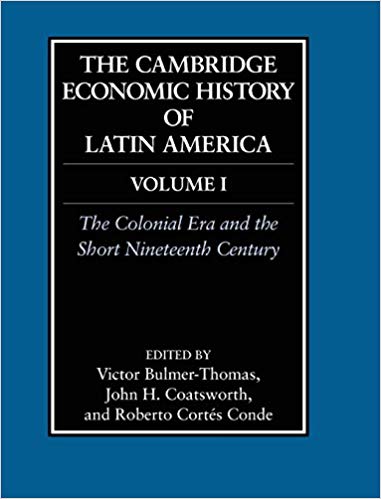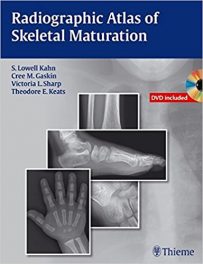 Volume 1 – The Colonial Era and the Short Nineteenth Century – 607 pages
Volume 1 – The Colonial Era and the Short Nineteenth Century – 607 pages
Volume II – The Long Twentieth Century – 755 pages
Editors: Victor Bulmer-Thomas, John H. Coatsworth and Roberto Cortes Conde
Publisher: Cambridge University Press – 1,362 total pages
Book Review by: Sonu Chandiram
This is the description of this book (Volumes I and II) on the first page: “The Cambridge Economic History of Latin America provides access to the current stage of expert knowledge about Latin America’s economic past from the Spanish conquest to the beginning of the twenty-first century. It includes work from diverse perspectives, disciplines, and methodologies from qualitative historical analysis of policies and institutions to cliometrics, the new institutional economics, and environmental sciences.”
The description goes on to state the features of the chapters, including that they provide comparative analyses of economic trends, sector development, and the evolution of the institutional and policy environment.
Volume I includes the colonial and independence eras up to 1850, linking Latin America’s economic history to the pre-Hispanic, European and African background. This volume also synthesizes knowledge on the human and environmental impact of the Spanish conquest, the evolution of colonial economic institutions, and the performance of key sectors of the colonial and immediately postcolonial economies. As a summary, it looks at the costs and benefits of independence.
Both volumes were first published 13 years ago in 2006. No indication is provided about later editions. Here’s a snapshot of the contents of Volume I, with 13 chapters in 4 Parts:
Introduction
- Part I – The Economic Background
- The Global Economic History of European Expansion Overseas
- African Connections with American Colonization
- The Pre-Colombian Economy
- Part II – Natural Resources and Factor Endowments
- Land Use and the Transformation of the Environment
- Demographic Impact of Colonization
- Labor Systems
- Part III – Economic Organization and Sectoral Performance
- Political Economy and Economic Organization
- Agriculture and Land Tenure
- The Mining Industry
- Pre-modern Manufacturing
- Commercial Monopolies and External Trade
- Money, Taxes, and Finance
- Part IV – Economic Impact of Independence
- The Economic Consequence of Independence in Latin America
Volume II treats the ‘long twentieth century’ from the onset of modern economic growth to the present. It looks at the principal dimensions of Latin America’s first era of sustained economic growth from the last decades of the nineteenth century to 1930. It explores the era of inward-looking development to the collapse of import-substituting industrialization and the return to strategies of globalization of the 1980s. As a summary, it looks at the long-term trend of capital flows, agriculture, and the environment.
Here’s a snapshot of the contents of Volume II, with 14 chapters in 4 Parts:
Introduction
- Part I – Cycles of Globalization
- Globalization in Latin America before 1940
- Foreign Capital Flows
- The External Context
- Globalization and the New Economic Model in Latin America
- Part II – Onset of Modernization
- The Institutional Framework
- Fiscal and Monetary Regimes
- Export-Led industrialization
- The Development of Infrastructure
- Part III – Factor Endowments
- Economic Growth and Environmental Change
- Labor and Immigration
- Education and Social Progress
- Part IV – Sectoral Development and Equity
- Structure, Performance and Policy in Agriculture
- The Political economy of Industrialization
- Poverty and Inequality
This is a comprehensive, detailed history of Latin America from an economic perspective, put together by three highly qualified, long-time, learned observers of that region of the world, who provide their expert objective views and perspectives on many aspects of Latin economic history, as well as their personal insights.
Editors:
Victor Bulmer-Thomas is the Director of Chatham House, the London home of the Royal Institute of international Affairs, and Professor Emeritus at the University of London. From 1992 to 1998, he was Director of the Institute of Latin American Studies (now the Institute for the Study of the Americas) at London University. He is the author of the Economic History of Latin America Since Independence (Second edition, 2003), and editor of Regional Integration in Latin America and the Caribbean: The political Economy of Open Regionalism (2001).
John H. Coatsworth is Monroe Gutman Professor of Latin American Affairs in the Department of History at Harvard University. In addition to serving as the Director of the David Rockefeller Center for Latin American Studies since its founding in 1994, he chairs the Harvard University Committee for Human Rights Studies. His books include Latin America and the World Economy Since 1800 edited with Alan M. Taylor (1998), and Culturas Encontradas: Cuba y Los Estados Unidos, edited with Rafael Hernandez (2001).
Roberto Cortes Conde is Professor Emeritus of Economics at Universidad de San Andres in Buenos, Argentina, and a corresponding member of the Royal Academy of History of Spain. A former Guggenheim Fellow, he has published numerous books and articles. His most recent books include: La economia Argentina en el largo plazo (siglos xix y xx); Transferring Wealth and Power from the Old to the New World: Monetary and Fiscal Institutions in the 17th Through the 19th Centuries (2002) edited with Michael D. Bordo; and Historia economia mundial (2003).







